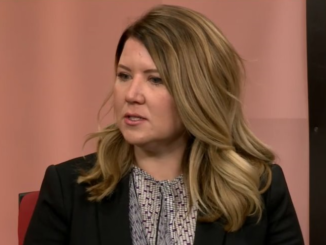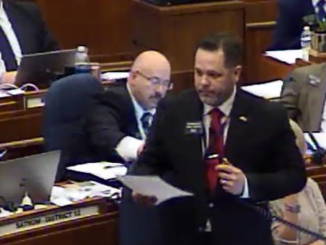
One of the first articles we published on The Minuteman Blog was called “Stop Raising the Government’s Kids”. I pointed out in that article that the most formative years of a child’s life will have been significantly impacted by the time spent away from home at a public school. I also pointed out the difference in the way most parents view their children as opposed to the state:
“You see, there’s a difference in the way children are viewed. To the state, these children represent a future tax base. They must be educated to ensure they are “contributing members of society”. This is quite a different view than what parents think of their children. For most of us, when we see our children, we see individual potential and endless possibilities for their personal growth and development. The one idea perpetuates a destructive socialistic view of the child and makes them a ward of the state, while the other can liberate, motivate, and sustain individual worth.”
As expected, some of the feedback from that article came from those who took exception with it. I’m okay with that. I expect a difference of opinion. And I’m used to it. But there’s some things that I’ve read lately that have caused me to once again think upon the subject. And I’m guessing that some will once again take exception with what I’m about to write.
Many years ago, my father told me a story about a local school board having a meeting with parents to consider starting Kindergarten at their elementary school. According to him, the school principal stood in opposition to the move. His position was summed up in a simple statement, “A child of that age has an attention span of about 15 minutes. What do you expect us to do with them the rest of the day?” His words fell on deaf ears. The school board voted to move forward with implementing Kindergarten.
This story rang in my ears after visiting with a mother recently. It was prior to the start of the school year and she was chatting about how her children were doing. The conversation turned to her five-year-old boy… a very energetic kid to say the least. She outwardly questioned whether he was ready for school and with a sympathetic giggle wondered if the school would suggest he stay home another year after they had him in the classroom for a while.
When I suggested to this mother that perhaps she should just keep the boy home and not send him until next year, she protested. Why? Because she “needed the break”. Yes, for this mother, it was better the school have to deal with him than her.
This mother is not alone, nor is her sentiment of needing a break the only reason some parents love the public education system. For others, they see the financial benefits. One financial blogger and mother wrote about “The Hidden Financial Bonus for Parents”to having kids in school.
Aside from thanking the “Federal government” for their public schools, this blogging mother points out that some parents save upwards of $1,000 per month in child care costs:
“We’re getting a big gift from the government; not only are they teaching our children in a way that will hopefully increase their earning power down the road, they’re also relieving us from what would be crippling (and, in most cases, mom’s-career-ending) child care costs.”
This mentality amongst some that public schools serve as de facto child care has now spread beyond the Kindergarten years. As is also pointed out by the aforementioned blogging mother, many preschools across the country now run through the summer months as well.
In 2015 North Dakota added itself to the long list of states that provide state-funded preschool. This happened when the North Dakota Legislature passed Senate Bill 2151 and then Governor Jack Dalrymple signed it into law. That biennium the legislature appropriated $3 million to children for preschool who qualified for free or reduced lunches.
Just this month, the North Dakota Department of Public Instruction (DPI) announced that they had received a $28 million grant from the United States Department of Education to “help strengthen reading, writing and comprehension skills for North Dakota students and preschoolers”.
As part of the application process for obtaining the grant, the Department of Education required that the state:
“…must describe in its application a high-quality plan to align, through a progression of approaches appropriate for each age group, early language and literacy projects supported by this grant that serve children from birth to age five…” (Emphasis Added)
I’ve submitted an Open Records Request to DPI for a copy of the “high-quality plan”. I’m particularly interested in the state’s plan for “birth to age five”.
I suppose such a grant shouldn’t be a surprise though. Back in March, it was announced that the Head Start Collaboration Office had moved from the Department of Human Services to DPI. And the State Superintendent of Public Instruction, Kirsten Baesler, praised the move as strengthening the department’s commitment to early childhood education.
So, just how far is this all going to go? How long before the push in North Dakota is for mandatory Head Start– entirely at taxpayer expense? After all, with grants that require a plan from birth on, it causes a person to wonder.
Is it really too far fetched to imagine a school board meeting or a legislative session where such things are advocated for? All in the name of “for the good of the children”, of course. I don’t believe it’s far fetched at all.
Think of it– We have calls for single payer healthcare. Grants for early childhood education from birth on already exist. Appropriations for Head Start are a reality. Public education is the standard. After school programs are even the norm in some areas. And in the last presidential cycle we heard a lot about free college as well.
We’ve now reached a point where far too many people have abdicated their parental responsibilities to the state. And considering all of this together, perhaps the state really isn’t the babysitter after all anymore. Parents get the kids evenings (if they don’t have after school programs or activities), weekends (and even some school activities fall on those now), and for the summer.
So, I’m left to wonder, “Are you babysitting the government’s kids?”
Sources:
1. http://day2dayparenting.com/qa-normal-attention-span/
2. http://www.getrichslowly.org/blog/2012/09/04/back-to-school-the-hidden-financial-bonus-for-parents/
3. http://blogs.edweek.org/edweek/early_years/2015/04/north_dakota_gets_on_the_preschool_train.html
4. https://www.nd.gov/dpi/SchoolStaff/ICR/press_releases/Baesler28MGrantWillStrengthenNDStudentLiteracy/
5. https://www.gpo.gov/fdsys/pkg/FR-2017-05-16/pdf/2017-09896.pdf
6. http://www.ndheadstart.com/nd-head-start-collaboration-office-transfers-to-nddpi/





